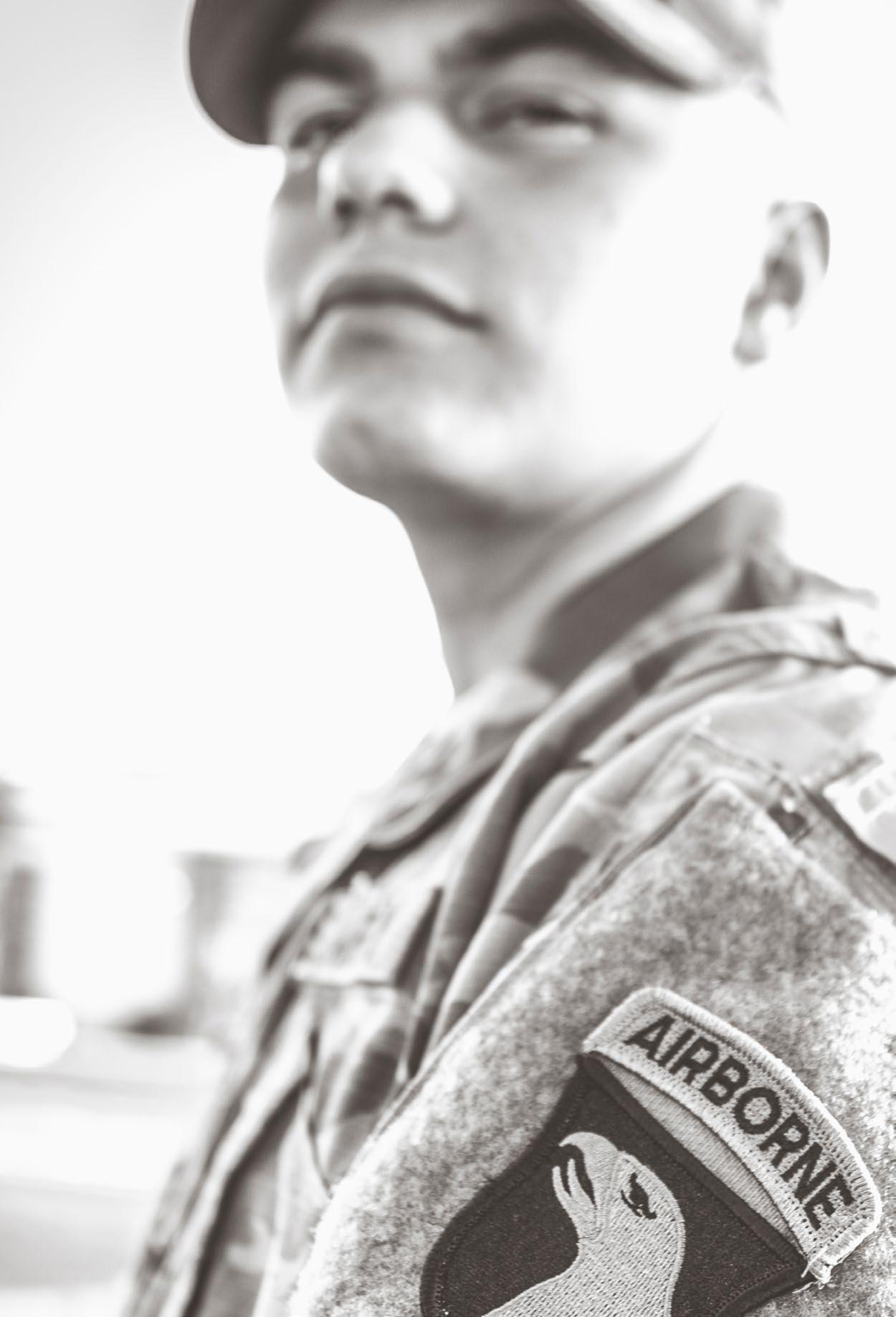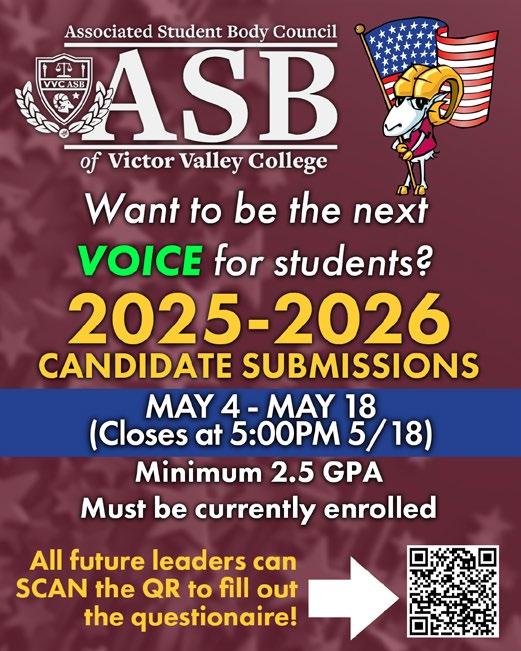











By: Esteban Penameza
As the month of May begins, we at Victor Valley College join the nation in observing National Military Appreciation Month. This is a special time to recognize and express our sincere gratitude for the dedication, sacrifice, and unwavering commitment of our activeduty military personnel, veterans, and their families.
Here in California, and especially in our High Desert region near Victorville, we are deeply aware of the significant contributions our military community makes to our society and our college. Many of our own students, faculty, and staff have served or continue to serve our country with honor. We deeply value their unique perspectives, experiences, and the immense strength they bring to our campus.
Throughout the month of May, we encourage you to take a moment to reflect on the freedoms we enjoy thanks to the brave men and women who have answered the call of duty. Let’s also remember the sacrifices made by their families, who provide invaluable support.
At Victor Valley College, we are committed to supporting our students, faculty, and staff connected to the military through resources such as the Veterans Resource Center located on the lower campus in building 80.01C. Please visit the VRC to learn more.
This month, let’s find ways to show our appreciation, whether it’s a simple thank you, attending a local event honoring our military, or supporting organizations that serve our veterans and active-duty personnel.
Thank you to all who have served and continue to serve. Your bravery and dedication are deeply appreciated.


NMAM started as a simple idea; to gather America around its military family to honor, remember, recognize and appreciate those who have served and those now serving and to know the history behind it all. May was chosen because it already has many days to recognize the U.S. military’s achievements.
In 1999, the late Senator John McCain introduced formal legislation to designate the month of May as National Military Appreciation Month. Both the Senate and House of Representatives adopted resolutions calling for Americans to recognize and honor U.S. Service Members during NMAM. These resolutions also urge the President to issue a proclamation calling on the people of the United States to observe NMAM.
Because most holidays commemorating historical military events have become little more than three-day weekends lacking focus on their original purpose, this month reminds Americans of the sacrifices and the history we have been privileged to participate in since the nation’s birth. During the month of May, the military is encouraged to support local engagements designed to draw public attention and illustrate public support and appreciation and thanks to the military family.
(Right) VVC student and U.S. Army veteran Mario Chavez. He served 4 years.
Mario served as a 91B(wheeled vehicle mechanic)
He was part of the 101st Airborne division (Air Assault)
He was Air Assault qualified and Airborne Qualified.
Successfully completed several missions for the Army including receiving the Phoenix Award for Mechanical excellence. Mario currently does Federal work study at the VRC and is the club treasurer for the VVC Veterans Club.

By: Andrew Caravella
When Michelle Smith walks through the halls of Hesperia Unified School District, there’s a sense of homecoming in every step. Not the ceremonial kind—the kind that’s rooted in lived experience. She didn’t just graduate from this district. She grew up in it, shaped by its classrooms, its culture, and its community. And now, she’s returned to lead it.
Back when she first enrolled at Victor Valley College, Michelle wasn’t planning on becoming an educator. “My goal was to complete the IGETC and transfer to a university to pursue business or law,” she says. But something
unexpected happened in her calculus class—she became the go-to person for classmates who needed help. “The joy and satisfaction it brought me to help people get through that difficult class is what made me decide I wanted to be a math teacher.”
The oldest girl in a family of seven kids, Michelle spent her early years in a mix of leadership and caretaking. “I feel like I was competing,” she says, “but more in the sense that I was taking care of my younger siblings. My older brother had more freedom, and my younger sisters were spoiled—the usual.”
Today’s students are growing up in a different
world than she did, and she’s acutely aware of how those differences show up in and outside the classroom. “Every generation has its unique experiences and challenges,” she says. “But the judgmentalism and addictive nature of social media—that’s something I didn’t have to face. I wish we could protect our children from it.”
She’s watched Victor Valley College evolve a lot since her time there. As a former high school principal and now district superintendent, she has a front-row view of how those changes are creating real opportunities. “VVC has such a strong partnership now with local high schools,” she says. “Helping students start their college courses while still in high school, and making

that transition smooth, makes a big difference. I’m proud to have brought dual enrollment to Hesperia High. Eleven years later, it’s grown and now serves so many students across the region.”
Not all her standout college memories are mathrelated. “I took a music class that got me hooked on classical—Vivaldi is a favorite,” she recalls. “But the highlight might have been a Geology of the National Parks class I took with my dad. We geeked out on plate tectonics together and bonded as learners.”
When asked about the hardest challenge in her career so far, she doesn’t hesitate. “Distance learning during the pandemic,” she says. “That was all about working together, supporting students however we could, and being flexible and creative with problem-solving.”
And the biggest shift in education since she started? Technology. “When I began teaching in 1994, it was chalkboards and textbooks,”
she says. “Now, instructional strategies have completely changed. And the expectations have shifted too—it’s no longer just about getting that diploma. It’s about completing career pathways, taking college courses, A-G completion, and working closely with counselors to have a plan after high school.”
As she settles into the role of superintendent, she’s focused on staying the course while pushing a few key areas forward. “We’ll keep working on family engagement and providing strong professional development for teachers,” she says. “We’ll continue leading the region in college readiness and career pathway completion. Next steps include strong early literacy so every student is a reader by third grade—and planning for growth with the Silverwood housing development.”
Education is a family theme in Michelle’s life. “We have teachers, administrators, and a director of risk management in the family,” she says. “Education is such an important career to invest in, and I’m proud of how many relatives are part of it.”
For the next generation coming up through these same classrooms, she leaves them with a clear message:
“Educate yourself today so you can be the best version of yourself in the future. There is nothing you can’t do if you commit to it and put in the effort. Don’t let anyone else’s doubts cloud your vision.”


Each year, Mental Health Awareness Month in May reminds us of the importance of emotional and psychological well-being. Mental health challenges affect millions of people across the country, from all walks of life. This month serves as a call to action—to break the silence, reduce stigma, and show compassion to those who may be struggling. It’s a chance to acknowledge that mental health is just as vital as physical health and deserves the same level of attention, care, and respect.
Raising awareness begins with recognizing the signs of mental health struggles—such as persistent sadness, anxiety, changes in behavior, or withdrawal from daily activities—and encouraging open, supportive conversations. It also means promoting access to care, advocating for improved resources, and creating safe spaces for people to seek help. Whether it’s a friend, a family member, or yourself, no one should have to face mental health challenges alone.
If you or someone you know is struggling, help is available. The National Suicide & Crisis Lifeline is accessible 24/7 by calling or texting 988, providing free and confidential support. Additional resources include the National Alliance on Mental Illness (NAMI) at nami.org and the Substance Abuse and Mental Health Services Administration (SAMHSA) at samhsa. gov. This Mental Health Awareness Month, let’s work together to build a future where seeking help is a sign of strength and mental health care is a universal right.

CAMPAIGNS BEGIN! Take a look at your current ASB as the search begins for our new student leaders!!
By:
The Associated Student Body (ASB) of Victor Valley College serves as the official student government, representing the student population and acting as a communication bridge between students, faculty, administration, and the High Desert community. The council is composed of enrolled VVC students and provides numerous opportunities for student leadership and engagement.
ASB members regularly advocate for student rights at conferences in Callifornia and out-of-state which dive into financial aid, equity, and a list of other student issues. The council collaborates with campus clubs and local partners to host student events and maintains relationships with the VVC Board of Trustees and administration. ASB meetings are open to the public, offering a space for students to stay informed on decisions and campus developments. The council remains committed to enhancing student life and ensuring student voices are heard campus-wide.
Here are some testimonies from the 2024-2025 elected and appointed student body:
ASB President & Student Trustee: Hailey Reyes:
“Serving as the Associated Student Body (ASB) President and Student Trustee has been an incredibly rewarding experience that allowed me to advocate for students at a local, regional, and national level. I’ve developed leadership, communication, and organizational skills while connecting with the community, our stakeholders,
and most importantly, students. This has empowered me to make a difference by sharing student stories, amplifying their voices, and creating a pathway for our students to succeed.”
ASB Vice President Tieast Jenkins:
“As the ASB Vice President at Victor Valley College, I’ve had the opportunity to help lead campus events, serve on impactful committees, and support student success goals while building lifelong friendships, gaining valuable experience, and connecting with student leaders across the country during inspiring trips like Washington, D.C., and our retreat in Big Bear—all of which have strengthened my leadership skills and fueled my passion to improve the education system for future generations.”
ASB Secretary Morgan Guillen:
“My experience in ASB as Secretary has not only been fun but very educational. Being Secretary has taught me how to attentively listen, and be present in the room with everyone else. ASB in general taught me how to be more understanding, patient, and helpful in my day to day life and on campus. I love getting to be a student leader, it’s improved my life.”
ASB Executive Senator Steven Guevara:
“Being in the Associated Student Body has given me opportunities that I would not think are possible during my collegiate career. As it has been a reason to give myself purpose to continue on school and transfer as I was able to lead and coordinate events for the betterment of students. On top of that I was able to grow as a leader and a person, now having the skills I need to better myself
for employment opportunities in the future.”
ASB Student Advocate DeAnn Fulton:
“My experience as student advocate has been an amazing experience. I was there to help pass 4 resolutions, 2 of which I wrote, and help our veterans and their families. I hope to run again next year.”
ASB Activities Senator Stephani Achor:
“As the activity senator for the current ASB council, I maintain a master calendar of activities/events occurring on campus and assist the ASB council with implementing activities for students such as the AAPI (Asian American Pacific Islander) event and Study-A-Thon event. During this past semester serving in this position not only has it further developed my ability to work as a team but also highlighted the importance of working as a team; Other important skills developed include time management and taking the initiative. Most importantly, my experience as the Activity Senator so far has been a fun and educational one.”
ASB Health Sciences Senator Savanna Blakken:
“As the Health Science and Public Safety Senator, I keep in touch with the STEM and Regional Public Safety Center departments within our campus. I have been able to establish a relationship with the people who work at our school by bridging the gap between students and faculty. These relationships have helped me to grow into a leader while learning how to navigate a relationship with someone in a mentorship fashion.”

ASB Fine Arts Senator Maurice Davis:
“My position as the Fine Arts Senator of ASB has been a fun. I have learned how creative and talented our campus is has been inspiring. Displaying a huge emphasis on creation and collaboration.”
ASB Social Science Senator Lorena Jimenez:
“My experience in ASB has been both fun and rewarding. It has opened up many opportunities for me to support my school while also providing valuable resources for my own personal growth. ASB is a big commitment but learning how to balance it with other responsibilities has taught me essential skills such as time management and organization.”
ASB Public Relations Senator Heather Davis
“In my time serving as Public Relations I’ve made meaningful connections with my council and the students we represent. I have had the opportunity to create change for our students during these times. I’ve had the chance as PR to bring positivity to our community through publicizing events and accomplishments by students. I am so grateful for the chance to have made an impact.”
ASB Athletics Senator Isaac Guevara:
“The experience that I gained in the athletics position is interesting. Getting to know our athletes from the various sports teams here and there insight on what’s it’s like is interesting. Also getting to keep up about how their team as a whole is very unique from the time I started until now.”
ASB Industrial Senator Amerie Fortune:
“This past semester I had the amazing opportunity to be the industrial science and logistics senator. I help the students that major in construction technology, automotive technology, welding, and aviation as well. I help d not only serve current VVC
students but also future students as well. I was able to get asb a table at one industrial technology’s biggest event industrial discovery day. This event in my opinion was an amazing opportunity because I was able to share our stories about what we can do for students not only at our campus also at the statewide level.”
ASB Science Senator Caprice Caasi:
“Through ASB, I have gained the opportunity to work with others, meet new colleagues and dignitaries, and refine my social and professional skills. My position has allowed me to stay grounded and connected with my community. I am thankful for the experiences provided by Victor Valley College’s student government.”
ASB Student Services Senator Bill Tate:
“I’m Bill Tate, the student services senator at VVC. My role primarily focuses on coordinating with our wonderful student services team to help our students. My favorite part of ASB is forming lifelong friendships with members of council.”



Could you imagine growing up without a parent because they died while serving in the U.S. military? For many Americans, this is the reality of life as a Gold Star Family—a term that originated during World War I, when families displayed service flags in their windows with a blue star for each serving member and a gold star to represent those who had died in action. Today, Gold Star Lapel Pins are given to the immediate next of kin of fallen service members as a solemn symbol of their sacrifice.
Victor Valley College student and Associated Student Body (ASB) member DeAnn Fulton took steps to honor that sacrifice in higher education. She authored resolution S25.24.06—Gold Star Family Priority Registration—which was brought
forward at the Student Senate for California Community Colleges (SSCCC) during the Spring 2025 General Assembly and passed unanimously. The resolution cites over 1.7 million Gold Star Family members nationwide, the 61.4% college enrollment rate for recent high school graduates, and California’s standing as the state with the largest active-duty military population. It formally resolves that the SSCCC advocate to the California Community Colleges Board of Governors to provide priority class registration to all Gold Star Family members at every community college in the state.
Victor Valley College has already implemented this policy beginning Spring 2025. “It was an
amazing experience and opportunity to be able to give back to our veterans and their families with this resolution,” said Fulton. Army veteran and VVC student Yasmeen Arnaout added, “Gold Star families may feel forgotten or overlooked, and priority registration is a simple form of recognition that will greatly improve the Gold Star students’ education journey as they suffer with the loss of their loved one. We recognize their unique sacrifice and support them.” The resolution will now move to the California Community Colleges Chancellor’s Office for potential adoption statewide.
(photo source: Gold Star medal -skysoldiersfoundation.org)


healthcare professionals from across the High Desert for a dynamic networking luncheon focused on strengthening industry partnerships and advancing student success.
This month’s spotlight was on healthcare, as leaders from several key organizations gathered on campus to connect with VVC’s Allied Health faculty and staff. Among the attendees were representatives from Valley Star Crisis Walk-In Center, Autism Behavior Services, Victor Valley Global Medical Group, Love Your Best Life, Providence St. Mary Medical Center, and Desert Valley Hospital.
The event created a space for meaningful dialogue around the evolving needs of the region’s healthcare landscape. These conversations helped bridge the gap between classroom training and real-world application, ensuring that VVC’s programs continue to prepare students to meet today’s healthcare challenges.
“As a Trustee, and having the goal of better connecting VVC to local industry, I get a great sense of accomplishment when I see the interaction of our senior leaders explain all the programs and pathways we have for those in the local region who want to better their industries. What I have found is once attendees hear about what we offer at VVC in the way of classes, designations, certificates, and programs, it starts some of the healthiest verbal dialogues I have seen in my 14 years at VVC. We have now done about fifteen industry luncheons. I see this event continuing for years to come and it only happens when you have a great team like VVC and Dr. Walden,” said Victor Valley College Trustee Joseph W. Brady.
Brady has played a foundational role in bringing these conversations to life, helping to shape the very framework that allows VVC to regularly engage industry leaders in high-impact, forwardthinking exchanges. These luncheons continue to open doors for collaboration that directly benefit students and regional employers alike.
Programs like Nursing, Allied Health, EMT, and Psychiatric Technician were central to the discussion. With high demand for qualified professionals in these fields, collaboration with healthcare leaders helps VVC align its curriculum with the realities of the workplace.
The timing of this collaboration is critical. Southern California’s healthcare sector is experiencing significant growth, with employment in health care and social assistance projected to increase from approximately 1.33 million workers in 2019 to over 1.5 million by 2024. This surge is driven by factors such as an aging population and expanded access to care, leading to increased demand for skilled professionals across various healthcare roles.
Victor Valley College extends its sincere thanks to its healthcare partners for their ongoing support. By working together, VVC and its industry collaborators are helping to build a healthier, more resilient community—one student at a time.


